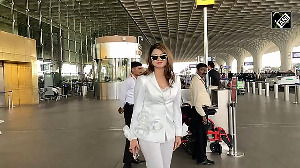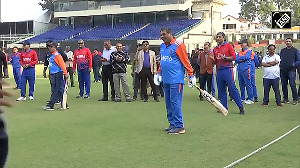 Former Prime Minister P V Narasimha Rao had done a lot of groundwork for constructing a Ram temple at Ayodhya but he could not carry his mission forward as the Congress lost power in the 1996 general elections, claims a new book by one of his close confidants.
Former Prime Minister P V Narasimha Rao had done a lot of groundwork for constructing a Ram temple at Ayodhya but he could not carry his mission forward as the Congress lost power in the 1996 general elections, claims a new book by one of his close confidants.
For two years, Rao -- with the help of his close aides -- meticulously planned to cobble together an apolitical 'trust' to take up the task of Ram temple construction at Ayodhya, but political demands ahead of the impending general elections did not let him realise his goal, retired Indian Administrative Servie officer P V R K Prasad says in a Telugu book 'Asalu Emi Jarigindante' (What Actually Happened) that was released last week.
Prasad, an IAS officer of 1966 batch, was an additional secretary in Prime Minister's Office and information adviser to Rao. He had a long-standing association with Rao since the latter's stint as the Andhra Pradesh chief minister in 1971.
The former prime minister, according to Prasad, felt the Ram temple could be constructed only after the case in the Supreme Court got resolved or if Hindus and Muslims sat and discussed together and arrived at an amicable decision.
Forming the apolitical Ram Temple Trust -- comprising heads of various Hindu mutts and religious bodies from across the country -- was one of the hardest political gambles that Rao, known as the 'apara Chanakya', had to play to checkmate the Congress' biggest political rival, the Bharatiya Janata Party, on the Ayodhya issue, according to the book.
"They (BJP) say they will build the Ram temple in Ayodhya. Is Lord Rama their own," PV questioned, even as he was immersed in deep thoughts over the temple issue, Prasad recollects in his book.
To counter the BJP on the temple issue, PV came up with an "amazingly new strategy", Prasad writes, saying the then prime minister wanted the Ram temple constructed through an apolitical trust, excluding the Viswa Hindu Parishad, with full support of the Government of India.
"There is only one solution... We have to form a totally representative apolitical committee with heads of various Hindu mutts and religious bodies and entrust the temple construction task to it," Prasad quotes PV as saying.
The main intention behind this was to counter the BJP's 'Ram temple construction agenda' ahead of the polls in four northern states (Himachal Pradesh, Uttar Pradesh, Madhya Pradesh and Rajasthan) and gain political mileage.
"Rama is Hindus' most revered God. Is he the BJP's own? What's their campaign? We can compete with the BJP but how can we do so with Rama," were the questions that bothered Rao, Prasad says.
"He (PV) knew that the BJP and the VHP would oppose the formation of any trust without their involvement and they would bring pressure on the mutt heads not to join that. Hence he wanted to make it look like the mutt heads themselves were taking the initiative," Prasad notes.
"PV wanted me to convey to the mutt heads and religious leaders that the government would support them fully and not others (read VHP)," he writes.
Image: Former prime minister Narsimha Rao






 © 2025
© 2025